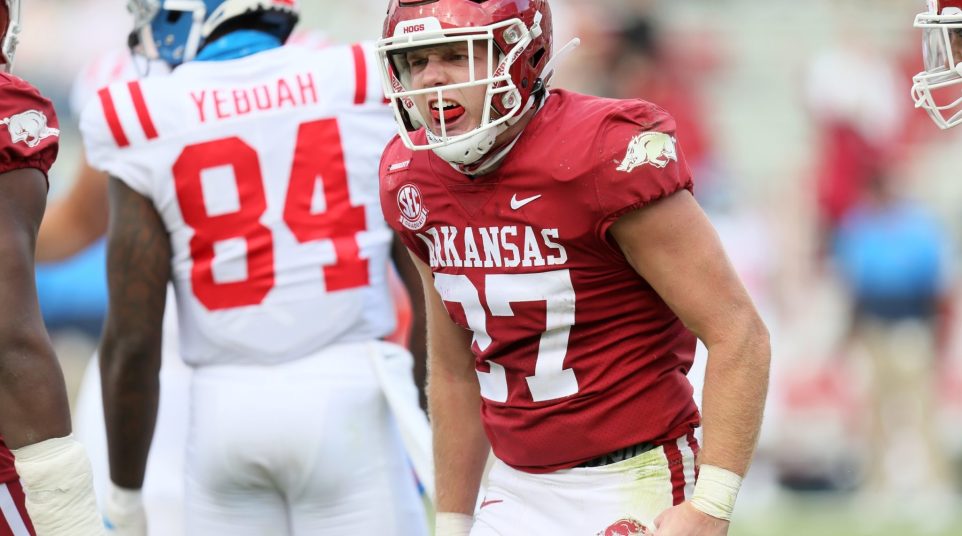
Why Arkansas should make the biggest defensive jump of any SEC team
Don’t get consumed by the raw numbers of Arkansas’ defense in 2020. They weren’t great. They weren’t even good.
The Razorbacks ranked No. 99 in scoring defense and No. 105 in total defense. More specifically they were No. 102 defending the pass and No. 92 against the run. They finished the year with a 4-game losing streak, and 3 of those games saw the Hogs surrender 50-plus.
Yikes. That’s not exactly the type of note any unit wants to end on. On the surface, that doesn’t exactly scream “inevitable improvement.”
I’ll beg to differ on that. In fact, I’ll take it a step further and say that no SEC defense will improve as much as the Hogs.
Yeah, part of that is because when you actually have room to improve and you aren’t a top-20 defense, it’s in the cards.
Is that my way of saying Arkansas will be a top-20 defense in 2021? No, but a top 30-40 unit doesn’t seem very far-fetched with Barry Odom back, especially for a group that allowed 24.7 points per contest in the first 6 games (that would’ve been good to finish No. 38 in 2020).
By the way, Odom got a raise to $1.75 million after putting up those lackluster raw numbers, which means only 2 defensive coordinators in America (Mike Elko and Alex Grinch) will make more than him. Why? Because through the first 6 games, Arkansas was an entirely different unit. Depth up front was a major issue to close the year. Even as Sam Pittman rose above expectations with a 3-3 start, the looming concern for the stretch run centered around defensive depth. In a year with COVID-related absences, the roster wasn’t in position to withstand injuries up front.
Losing top pass-rushers Jonathan Marshall (NFL) and Julius Coates (transfer portal) won’t help that “destined to improve” argument, but returning a healthy Dorian Gerald will, as well as getting a shot of life from new defensive line coach Jermial Ashley. At Tulsa, Ashley helped a top-30 defense that finished No. 12 in FBS in tackles for loss per game. Pittman knows that depth issues or not, 1.4 sacks per game won’t cut it in the SEC, and neither will a pressure grade that PFF ranked last among SEC teams.
The good news? And perhaps the entire reason that defensive improvement feels imminent beyond the whole “it’s not an all-SEC schedule” thing?
(I do actually think the schedule thing is a factor. The Arkansas defense seemed like a team that really could’ve used the occasional Group of 5/FCS break to get healthy at points last year instead of battling SEC rosters every week. I thought the Mizzou game was a good example of a unit that ran out of gas.)
It’s what Arkansas returns. The Hogs are No. 15 in FBS in percentage of returning defensive production, which is the best in the SEC.
Sure, it helps when tackling machine/folk hero Grant Morgan is back. Morgan racked up 111 tackles in just 9 games, which was good for No. 3 in FBS. The first-team All-SEC linebacker, who missed the regular-season finale, is back to lead a unit that includes fellow starting linebacker Bumper Pool (who also was banged up down the stretch), as well as breakout safeties Jalen Catalon and Joe Foucha. Marshall is the lone starter Arkansas will replace.
The guys up front who got significant snaps as underclassmen in 2020 like Isaiah Nichols and Eric Gregory should get to play alongside Zach Williams, who flashed major potential early before playing limited snaps in the latter half of the season. It’s defensive end where Arkansas needs to get better, though the pieces are in place for that to happen.
The other good news is that instead of getting their first spring practice with this coaching staff wiped out like it did last year, this Arkansas defense is getting a (relatively) normal spring. It no longer has to adapt to Odom’s 3-2-6 on the fly. That seems as significant as anything.
This is the first time since 2013 at Memphis that Odom has a Year 2 as a coordinator. That group went from No. 80 in FBS to No. 45 with an improvement of nearly 6 points per game. More notable was the fact that Odom turned Memphis into the No. 11 run defense in America in Year 2.
He hopes to do at Arkansas, where he stayed instead of leaving for a job like LSU or Texas, both of which reportedly offered more than what Odom got to stay in Fayetteville. It’ll be interesting to see what Odom does with expectations. This is no longer a roster that’ll be compared to one with NCAA sanctions like last year’s group (according to an anonymous coach). This is a group that, when healthy, showed it could slow down legitimate SEC offenses. Even if the takeaway numbers decline, the Hogs defense should improve in virtually every other area.
The last time Arkansas had a defense finish in the top half of FBS in scoring was 2014. That’s actually the only time that happened in the post-Bobby Petrino era, which is now entering Year 10 (what a strange thought). That should change in 2021. It’ll be a surprise if Arkansas doesn’t improve by a touchdown per game.
Soon, those raw numbers will be worth looking at.
